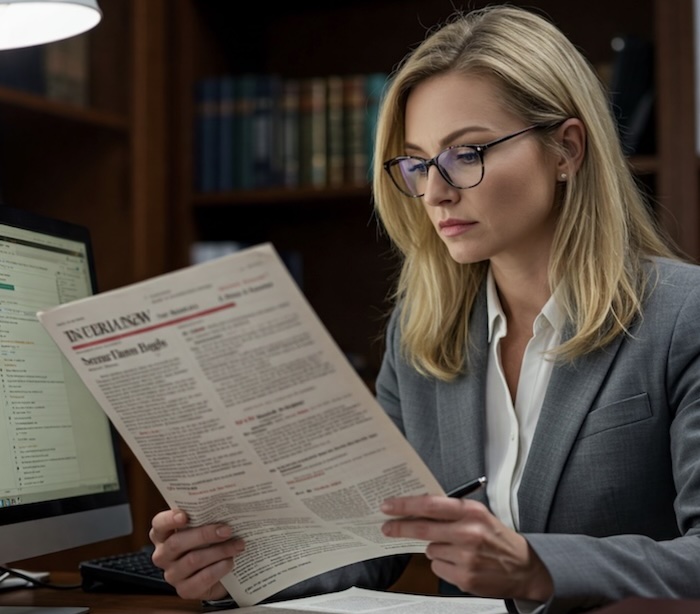 Many news stories involve straightforward reporting on events, but some more complex stories might require legal advice before they are published.
Many news stories involve straightforward reporting on events, but some more complex stories might require legal advice before they are published.
Large media organisations often have the luxury of a ‘media lawyer’ who is on the end of a phone day and night.
Their job is to offer expert advice when an editor feels a story is straying into dangerous legal territory.
Small media outlets probably can’t afford such expertise – but they will need legal advice nonetheless.
One small media house that Media Helping Media has advised in the past had a media lawyer on the board of management, another had a young staff member who had graduated in media law on hand to advise when needed.
However it’s done doesn’t matter, what’s important is that senior editors need someone to turn to 24/7 to help them gather, produce and publish news legally.
In some countries the independence and reliability of legal systems is questionable, and there might be a temptation to ignore the law in favour of a more pragmatic approach. But there is never a downside to considering carefully the legality of what you doing. It is always worth having good quality legal advice, even if sometimes you think it makes sense, for other reasons, to modify or ignore it.
The role of the media lawyer
Media lawyers specialise in legal matters related to the media and entertainment industries. Their role is to make certain that news organisations operate within the bounds of the law. Here’s a breakdown of their main functions:
- Pre-publication review: Media lawyers offer advice on content before it’s published or broadcast. Their job is to spot and lessen legal risks such as defamation, invasion of privacy, copyright infringement, and contempt of court. This proactive step can prevent costly lawsuits and reputational damage.
- Defamation advice: They assess potentially defamatory content, advising journalists on the importance of accuracy, fairness, and the public interest defence. They can help shape the wording used to reduce legal risks whilst still getting the necessary information across.
- Privacy and data protection: Media lawyers guide news organisations on laws related to privacy, including the handling of personal data and the right to a private life, ensuring compliance with regulations such as GDPR.
- Copyright and intellectual property: They advise on the use of third-party content, ensuring that news organisations have the necessary rights and licences for images, videos, articles, and other materials. They also help protect the organisation’s own intellectual property.
- Contempt of court: They provide guidance on reporting legal proceedings to avoid actions that could prejudice a fair trial.
- Access to information: Media lawyers can advise on freedom of information laws and the right of the press to access certain documents and events.
- Journalist safety and rights: They can offer support and advice on the legal rights and protections afforded to journalists in their newsgathering activities.
- Responding to legal threats: If a news organisation faces a legal challenge, a media lawyer will handle the response, represent the organisation in court, and work to achieve the best possible outcome.
- Training and compliance: Media lawyers often provide training to journalists and editorial staff on media law and best practices to foster a culture of legal awareness within the organisation.
The importance of legal advice
The risks associated with publishing and broadcasting news that could be legally dodgy are considerable. Here’s why having access to a media lawyer is crucial for every news organisation:
- Risk mitigation: Media lawyers are experts at spotting and assessing legal risks that journalists and editors might not be fully clued up on. Their advice can prevent costly legal battles and reputation damage.
- Ensuring legal compliance: They help news organisations navigate the ever-changing landscape of media law, ensuring they comply with regulations related to defamation, privacy, copyright, and more.
- Protecting media freedom: While ensuring compliance, media lawyers also understand the importance of the public interest and can help news organisations defend their right to publish in appropriate circumstances.
- Maintaining journalistic integrity: By providing legal guidance, media lawyers help journalists operate ethically and responsibly within the bounds of the law, contributing to the credibility of the news organisation.
- Cost-effectiveness: While it might seem like an added expense, proactively seeking legal advice can save money in the long run by preventing lawsuits, fines, and settlements.
- Navigating complex issues: Media law can be intricate and complicated, a media lawyer has the specialised knowledge to interpret and apply the law to specific journalistic situations.
- Providing a strong defence: If legal action is taken, having an experienced media lawyer representing the organisation is essential for putting up a robust defence.
- Building confidence: Knowing they have legal expertise to rely on can empower journalists and editors to pursue important stories with greater confidence.
In essence, a media lawyer isn’t just a legal advisor but a strategic partner for any news organisation committed to responsible and impactful journalism. Their expertise helps to safeguard the organisation’s legal standing, protect its reputation, and enable it to fulfil its vital role in informing the public.








